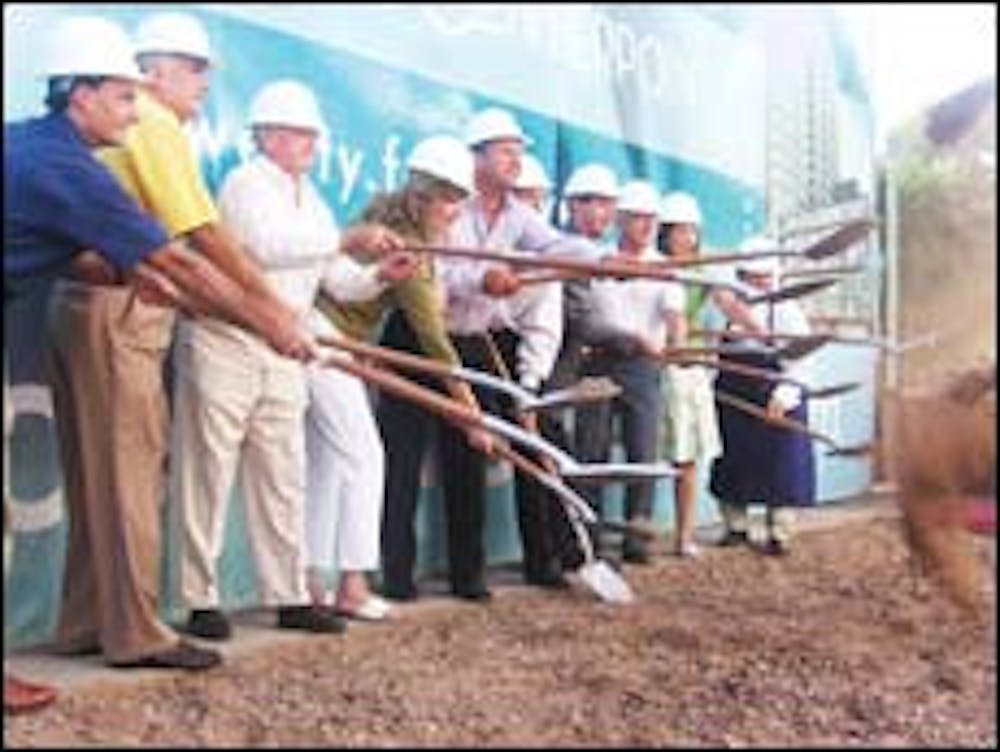A former parking lot near Centerpoint Plaza will soon be an upscale home for more than 2,000 residents.
Staff from Avenue Communities LLC joined several officials from the city of Tempe to break ground on the first phase of Centerpoint Condominiums on Wednesday. The first phase of the multi-stage development, located at the corner of Maple Street and Sixth Street, is scheduled for completion in spring 2007.
Ken Losch, one of the project's principal planners, said that the condominiums will help transform downtown Tempe into a more urbanized environment.
"Downtown Tempe is a jewel," Losch said. "It's an urban 18/7 environment. We need it to become a 24/7 environment."
The project will eventually include four 22-story mixed-use buildings with more than 775 condominium homes. The structures will be the tallest in the city.
Tempe city Councilwoman Pam Goronkin said Centerpoint Condominiums and similar projects would help boost the downtown economy by bringing new, wealthier residents to the area.
"We'll have people, many of whom will have deep pockets, to afford these kinds of residential units living and spending their money in our downtown economy," she said.
Tempe Mayor Hugh Hallman said residential projects like Centerpoint would provide the missing link in a city that already has strong business, entertainment, and retail sectors.
He also said that Centerpoint's presence would help lead to the establishment of new businesses offering "residential supportive services" in the downtown area, including dry cleaners and pharmacies.
Such establishments would offer staple goods and services within walking distance of the surrounding neighborhoods. This could help create an environment where people wouldn't have to drive everywhere just to get to a grocery store, for example.
Goronkin said that Tempe residents should not fear the changes heralded by these new projects and realize they will benefit from their new "urban neighbors."
"I'm talking about things like drug stores, grocery stores, dry cleaners, doctors and so forth, not to mention white table cloth restaurants, music clubs," she said.
In general, bar and restaurant operators closest to the Centerpoint construction site, such as Aaron Davies, a manager at Fat Tuesday, seemed to feel that that the rise of the condominiums would help create new customers for their businesses.
"People ... living around the area can only mean more business for local merchants and the bars," Davies said.
But some, like Natalie Crogan, an assistant manager at Islands Fine Burgers and Drinks, were worried that the reduced availability of parking would decrease customer traffic during the construction period.
"People generally don't want to have to go down to an area where it's hard to get to or hard to deal with parking," Crogan said.
Jeff Hudson, a manager at Z Tejas Grill, said he felt that the loss of the nearby parking lot would be less worrisome if he knew enough spaces were built to replace those that are being eliminated. With less parking available, potential customers could be less inclined to dine there, he said.
"I think at lunchtime when people don't have as much time, if they don't have places to park, then they're not as likely to come down here," Hudson said.
When finished, the first phase of the development will include 176 condominium residences with prices ranging from about $250,000 to $2 million. Other aspects of the building include a 23,150 square-foot public plaza with an enormous television showing local programming, multi-level parking with 1,976 spaces, and a 13,657-square-foot gourmet-cafe grocery.
Reach the reporter at grayson.steinberg@asu.edu.




